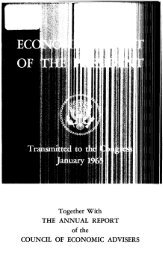Economic Report of the President
Report - The American Presidency Project
Report - The American Presidency Project
- No tags were found...
Create successful ePaper yourself
Turn your PDF publications into a flip-book with our unique Google optimized e-Paper software.
industries. Substantial and numerous innovations in <strong>the</strong> financial sectorsin <strong>the</strong> last decade largely preceded and were later facilitated byrecent partial deregulation.DEPOSITORY INSTITUTIONSThe present structure <strong>of</strong> regulatory restraints on commercial banksand o<strong>the</strong>r depository institutions was imposed primarily in responseto <strong>the</strong> collapse <strong>of</strong> <strong>the</strong> banking system in <strong>the</strong> 1930s. A common interpretation<strong>of</strong> <strong>the</strong> events at that time is that <strong>the</strong> banking collapse was<strong>the</strong> result <strong>of</strong> an unsound banking structure which caused too muchcompetition. Competition among banks was thought to force <strong>the</strong>minto paying high interest rates for deposits, which in turn led <strong>the</strong>m toseek out high-yielding but risky—and ultimately unsound—investmentsin <strong>the</strong> stock, bond, and real estate markets.Legislative remedies in <strong>the</strong> Banking Acts <strong>of</strong> 1933 and 1935, andvarious revisions <strong>of</strong> <strong>the</strong> Federal Reserve Act, focused on limitingprice competition between banks, separating banking from securitiesmarket activity, supervising banking and financial markets moreclosely, and restoring public confidence in <strong>the</strong> financial system.Reflecting a general concern about excessive competition, <strong>the</strong> payment<strong>of</strong> interest on demand deposits was prohibited by law. In addition,<strong>the</strong> Federal Reserve Board and <strong>the</strong> Federal Deposit InsuranceCorporation were given <strong>the</strong> power to place interest rate ceilings on<strong>the</strong> passbook and time deposits <strong>of</strong> commercial banks. Interest rateceilings were extended to <strong>the</strong> deposits <strong>of</strong> mutual savings banks andsavings and loan associations in 1966.The type and quality <strong>of</strong> assets held by banks were closely monitored.Commercial banks were not permitted to hold securities <strong>of</strong> aspeculative nature in <strong>the</strong>ir portfolios, and thrift institutions were subjectto even greater limits on <strong>the</strong>ir asset acquisition powers. In addition,most securities activities were divorced from commercial bankingby <strong>the</strong> Glass-Steagall sections <strong>of</strong> <strong>the</strong> Banking Act <strong>of</strong> 1933, andentry into banking became more closely controlled. To maintain <strong>the</strong>confidence <strong>of</strong> <strong>the</strong> public in <strong>the</strong> banking system, deposits were insuredby <strong>the</strong> Federal Deposit Insurance Corporation and <strong>the</strong> Federal Savingsand Loan Insurance Corporation. With <strong>the</strong> introduction <strong>of</strong> depositinsurance, <strong>the</strong> o<strong>the</strong>r regulations served mainly to limit <strong>the</strong> exposure<strong>of</strong> <strong>the</strong> insurance funds ra<strong>the</strong>r than to protect depositors. Never<strong>the</strong>less,recent studies suggest that <strong>the</strong> web <strong>of</strong> regulatory restraintswas generally greater than required for this purpose.Moreover, this extensive regulatory framework for financial institutionshas adapted slowly to <strong>the</strong> economic changes <strong>of</strong> <strong>the</strong> last two decades.High inflation rates and consequent high nominal interestrates, combined with reduced transactions costs from <strong>the</strong> application116
















